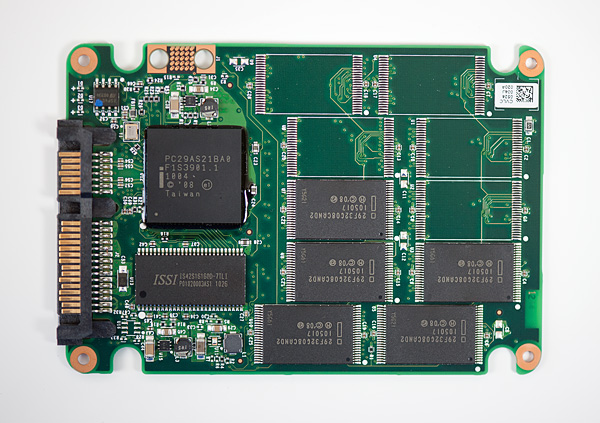Z68 SSD Caching with Corsair's F40 SandForce SSD
by Anand Lal Shimpi on May 13, 2011 3:06 AM ESTFinal Words
Despite what it may look like, Intel appears to have picked the best balance of capacity and performance with its 20GB SLC SSD 311. While I agree that $110 is a bit steep, the SSD 311 does offer surprisingly well rounded performance as a cache. Intel mentioned to me that it did some tweaks to the 311's firmware to improve its performance as a cache, which could help explain just how well it does in our tests. Where the 311 does fall short however is in its capacity and pricing. I'd like to see a 40GB drive priced below $80, however even with a move to 25nm NAND I'm not sure we'd see that from Intel.
Corsair's F40 does pretty well as a cache and if you've got one around the house by all means go for it. Unless you've got a huge collection of applications and games that you'd like to cache however, I'd stick with the 311 at the same price point. If you can snag a F40 for a reduced price however, that does make it a lot more attractive. Here's to hoping that Corsair can push prices down below $85 on that drive for the Z68 users out there that want to experiment with SSD caching.












81 Comments
View All Comments
jordanclock - Friday, May 13, 2011 - link
I like the idea of this article and it starts providing some extra data that was asked for in the original review: What about other SSDs? Could we get some more SSDs tested with SRT? I'm not expecting Vertex 3s, but some "older" SSDs like the F40 that would likely be replaced soon.MrSpadge - Friday, May 13, 2011 - link
Currently Anand tested 3 mid- to high performance SSDs and I think this gives us a pretty good picture overall. However, if another one was tested I'd want the 64 GB Agility 3 and/or Solid 3. Well, a proper review of them would be very nice anyway ;)MrS
Cow86 - Friday, May 13, 2011 - link
Yea I was thinking the same thing...they supposedly perform a lot better, while still being reasonably affordable for the 60GB drives (~110 euro's here). Maybe they'd be the ultimate cache at a reasonable price point? Either way would love a review of those as well, vertex 3 is staying rather expensive :(jebo - Friday, May 13, 2011 - link
I agree that the Agility 3 and Solid 3 look very promising.therealnickdanger - Friday, May 13, 2011 - link
Plus, SRT works with drives up to 64GB, so it seems worth it to test a drive of that size. I imagine there are many users (such as myself) that have older Intel 80GB, Indilix 64GB, or SandForce SF1200/1500 64GB drives that will soon be replaced with faster 6Gbps drives.I would imagine that you could a drive of any size, especially the larger ~120GB SSDs that offer significant speed advantages over the 64GB models. SRT would limit the usable cache to 64GB, but it would still be interesting to see...
*wink**hint*
Boissez - Friday, May 13, 2011 - link
Yup - Here's another vote for that article. I have an 'old' 60GB agility 2 boot drive and a Z68 board on it's way. Question now is whether I keep it as boot drive or whether I take a performance hit and use it as cache. This article comes close to answering it yet Anandtech's own SSD workload benchmarks (which are the most interesting IMO) does not include the F40's numbers.GullLars - Tuesday, May 24, 2011 - link
If you can fit your OS and core apps/games on your agility 2, it's a no-brainer, keep it as you have. If you have a lot of apps and games you have had on HDDs and use often, you could concider trying it as cache.I have 3 computers with 32GB boot drives (1 laptop, HTPC, and a donated SSD to my fathers computer), and all of them get by fine with that with a little bit of management. You could concider using 30GB for caching and 30GB for OS + core apps, getting full SSD speed on the stuff you use the most, and have cache help out on game loads and more seldom used apps.
Mr Perfect - Friday, May 13, 2011 - link
That's what I'm thinking too. Get yourself the largest, fastest cache you can and see what happens. :) Currently that's looking like a 64GB Agility 3 or Solid 3.samsp99 - Friday, May 13, 2011 - link
I was just asking myself this very question...genji256 - Friday, May 13, 2011 - link
I'm confused. If the 311 performed better on the second run ("Intel 311 - Run 1" in your table), shouldn't that mean that the cache was large enough to store the data for all the applications (since they all ran during the first run)? If so, why would there suddenly be data evicted from the cache between the second and third run ("Intel 311 - Run 1" and "Intel 311 - Run 2" respectively)?